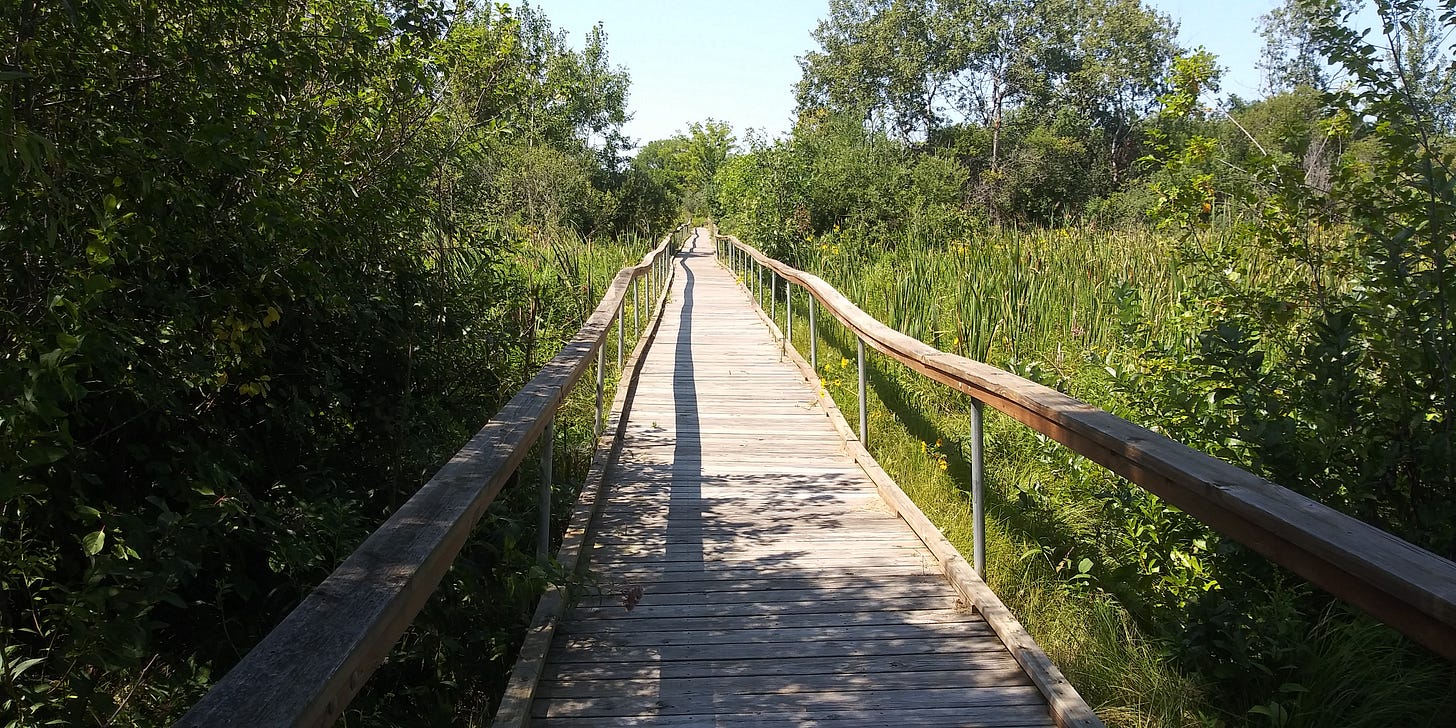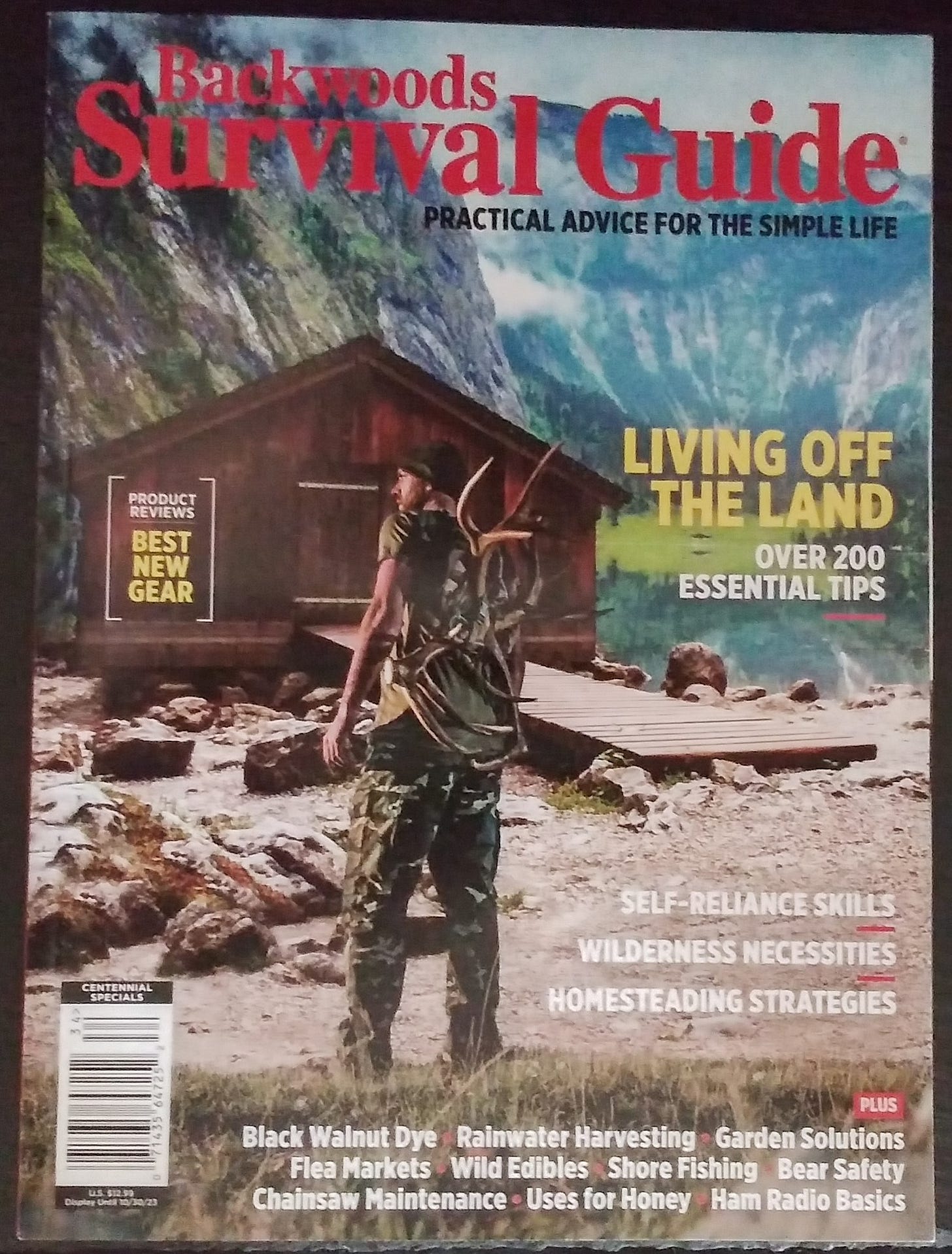The Survival Weekly Dispatch - Volume 10, Issue 33
National Preparedness Month -- Week 1
Hey everyone, thanks for checking out the newsletter this week. Happy National Preparedness Month! Okay, I’m a day early, but better early than late. September is indeed National Preparedness Month here in the United States, and has been since 2004. September was chosen due to 9/11. Plus, this month is typically the busiest when it comes to hurricane season.
As I usually do each year, I’ll be sharing prep tips and suggestions in this newsletter each week. Most of them will be reprints of things I’ve posted on Facebook, so if you want to get them live, send over a friend request.
Give some thought to what you could do this month to increase your readiness for emergencies and disasters. It doesn’t need to be anything drastic, either. Simple things like testing your smoke detectors, checking your home insurance coverage, or inventorying and organizing your first aid supplies are all fairly easy, yet very important.
* * *
After a bit of an absence, I’ve started writing for Field & Stream again. One of my first assignments was this guide to choosing an EDC flashlight. As I put in the article, I wasn’t always a flashlight guy, but once I started carrying one, I wondered how I’d gotten along without one.
* * *
Prep Tip: Do what you can to get into shape. Losing the extra pounds makes you more mobile as well as healthier. You don’t need to be ripped and stacked, just be able to walk up a flight of stairs without feeling like your heart is going to explode. Emergencies are stressful and the healthier you are, the better you’ll be able to handle it.
* * *
I was curious, so I dipped into my files a bit to find out how many different magazines I’ve worked with in my career thus far. While not as many as some of the writers in my immediate circle, I’m still pretty pleased with this list. I might be missing one or two. These aren’t in any specific order. I just jotted them down as I came across the files. The list goes back to 2010. The PI Mag article appeared a few years before that, but there was a lengthy gap between it and when I started writing professionally.
· Survivalist Magazine
· Boy’s Life
· PI Magazine
· Backwoods Survival Guide
· Prepper Survival Guide
· American Survival Guide
· American Outdoor Guide
· EDC
· Field & Stream
· Knives Illustrated
· Recoil OFFGRID
· Survivor’s Edge
· Living Off the Land (Backwoods Survival Guide special issue)
· Coronavirus (Prepper Survival Guide special issue)
· Living Off the Grid
· Survive! (American Handgunner special issue)
· Countryside
· Living On Less (Backwoods Survival Guide special issue)
* * *
Prep Tip: Your pets depend on you, don’t let them down. Make sure to stock up on food and other supplies for them, as well as account for their water needs. Don’t overlook pet medications as well as first aid supplies, and know how to use them.
* * *
Did you know you can sign up for a free trial run for my Patreon feed? There are two levels. For $5/month, you get three posts a week delivered to your inbox. For $8/month, you get a post every single day. All the details are found on my Patreon page.
* * *
When my kids were younger, I spent a bit of time as a coach for their Destination Imagination program. For those not familiar with DI, it’s sort of like those academic team programs where they have to devise ways to keep an egg from breaking when it lands from a 10-foot fall, but with some stage performance mixed in.
At the tournaments, part of the team’s overall score was based on how they did with the “Instant Challenge” presented to them. Basically, the team would be taken to a closed room with the judges and presented with a challenge to solve in a short period of time.
Here's one example of an Instant Challenge. The team might be given five minutes to build the highest structure they can that will support a baseball, using coffee stirrers, toothpicks, mailing labels, pencils, and paper clips. The structure must hold the baseball for a full ten seconds. Points are earned based on the height of the structure, as well as the overall creativity in the solution. A key element is also how well the team works together to solve the challenge.
Now, I tell you all of that so I can tell you this. I was the Instant Challenge coach for our school district’s program. One year, I sat in with one of our middle school teams when they did their Instant Challenge. The challenge presented was similar to the structure one I described above. When the time started, the team just…froze…in…place. They looked at each other, they looked at the supplies. Nobody spoke, nobody moved. Tick…tock…tick…tock. This went on for easily three full minutes before one of them finally picked up the coffee stirrers and began futzing around with them. This finally got the team moving and they cobbled together a pretty shoddy structure. They didn’t earn many points because they ran out of time before they could really get moving.
In talking to the team later, they all said that they just couldn’t get their minds engaged. It was like they were stuck in Park and couldn’t shift into gear.
Analysis paralysis is a thing, and that’s what happened to them. Each of them was so caught up in thinking that they couldn’t move forward into doing. What finally got them moving was when one of them picked up some of the supplies. Getting hands engaged helped to kick the mind into the right gear.
When you’re presented with a challenge, remember this. If you can’t get your mind to move off the X, so to speak, try being moving around and being active. Letting your mind wander a bit as you accomplish other things can also help.
Do something, or you’ll end up doing nothing.
* * *
It was cool enough over the weekend that we could take the mutts with us on our hike. It has been so hot and muggy the last several weeks that we’d been leaving them home. Based on how happy they were getting into the car, they’d certainly missed going along.
Survival Tip – Cash and the Bug Out Bag
Should you have cash in your bug out bag or other emergency kit? I see that question pop up from time to time. Here's my take on it.
What seems to be a running theme in many forums, is that cash will be worthless in a major collapse, such as an EMP. While that's probably true, cash has value right up until it doesn't. If the disaster hasn't reached national proportions, odds are that those dollars and cents will still be accepted in most places.
Don't get me wrong, if there is a financial collapse and the bottom falls out of the dollar, then of course our current currency will be worthless. But again, it still works just fine up until that happens.
Cash can solve an awful lot of problems in an emergency. It can get you a place to stay for the night, food to eat, clothes to wear, and just about anything else you need. Cash is king 99.9% of the time.
How much cash should you have in your BOB or with your evacuation supplies? I'd recommend at least enough to pay for a full tank of gas, a decent motel for a night or two, plus meals for a couple of days, maybe a little extra for a cushion. Stick to small bills, nothing larger than a $20, as many smaller businesses don't like big bills or may have trouble making change.
Related to this is whether you should keep gold or silver in your BOB. If one has to choose between cash and precious metals, I'd go with cash every time. While there are definitely SOME gas station attendants who would gladly accept gold or silver instead of US currency, I know that ALL of them will accept cash.
Even though you might be utterly confident as to exactly what that gold coin is worth, the 17-year-old manning the register at the Mobil station in the middle of nowhere might not have a clue and may be reluctant to accept it in lieu of what he sees as real money. If things are so serious that you're needing to use gold to pay for gas, do you really want to waste time trying to convince him that it is real?
Let's put it this way. If you and I pull up to the same gas station at the same time and I have $100 cash and you have a gold coin, want to bet which of us is going to be able to put gas in their vehicle or buy some food?
If you have the means to keep precious metals in addition to cash in your kit, go for it. I'm just saying that if you need to choose between the two, cash is likely to get you further.
What about credit cards? If there is a major power outage, many places may not be accepting credit cards because their systems will be down. In those cases, they may still accept cash. However, if you have a card you that can use for as long as those systems are running, that can extend your cash supply for a bit. Every purchase you can make with the credit card is one you don't need to spend your cash on, right?
Whenever I mention this subject, I get some push-back about the idea of keeping money in the bug out bag. People fear that the bag could get stolen out of the trunk or something and you’ll lose the cash on top of all your gear. That is a valid point. However, if I titled this essay – Keeping Cash in the Bug Out Bag or in Another Easily Accessible but Totally Hidden and Secure Place in Your Vehicle, well, people already complain that these essays are too long, let alone using a full paragraph just for the title.
The takeaway here is that you might consider stashing some money where you can access it in an emergency if you’re on the road or you need to evacuate in a hurry. If you don’t want to keep it in your bug out bag, find somewhere else to stash it.
If you're thinking that there's no way you'd ever need to spend money on anything during an evacuation, you lack imagination. There are any number of things that could happen that would cause you to end up deviating substantially from your bug out plan. Better to be prepared than to be caught flat-footed.
Prepper Survival Guide and Backwoods Survival Guide
For those new to my little corner of the Internet, I am the Editor in Chief for both Prepper Survival Guide and Backwoods Survival Guide magazines. Here are the covers for the current issues that are available in stores right now.
You can find them just about anywhere magazines are sold, including:
Walmart
Sam's Club
Costco
Publix
Walgreens
Rite Aid
CVS
Tractor Supply
Fleet Farm
Barnes & Noble
There are plans in the works to offer subscriptions and I’ll be sharing those links as soon as they’re available.
Questions, Comments, Complaints, Concerns?
I am always just an email away - jim@survivalweekly.com.



